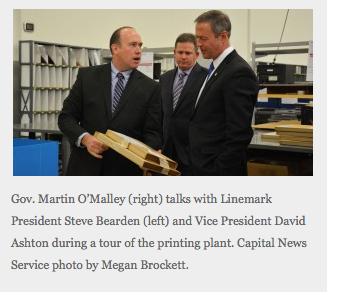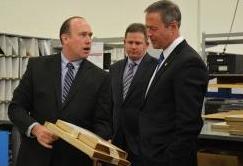 A day after House Republicans unsuccessfully pushed to amend Gov. Martin O’Malley’s minimum wage bill to provide greater protections for businesses, O’Malley touted the plan Thursday, March 6 before a group of business owners who support an increase of the state’s minimum wage.
A day after House Republicans unsuccessfully pushed to amend Gov. Martin O’Malley’s minimum wage bill to provide greater protections for businesses, O’Malley touted the plan Thursday, March 6 before a group of business owners who support an increase of the state’s minimum wage.
O’Malley’s proposal, which would gradually raise the base rate of pay for most workers to $10.10 an hour, was expected to go before members of the House for a vote on Friday, March 7.
Sitting around a conference table at Linemark printers, O’Malley and about a dozen business people from across the state discussed how a hike would benefit companies of all sizes by boosting the economy and reducing turnover costs for companies.
“From time to time, we raise the minimum wage to keep pace with inflation for the people who work at minimum wage,” O’Malley said. “But also, as importantly, it’s to make our economy grow. Because the more a worker earns, the better able they are to be good customers for business. … When people earn more, businesses have more customers.”
Linemark President Steve Bearden was one of several business owners who told the governor that paying a higher wage has contributed to the success of his company.
Bearden said his business employs 125 people and pays a starting wage of $10.50 an hour, which he said has helped tremendously with employee retention.
Nancy Meyer, CEO of Community Forklift in Edmonston, said that a small business’ biggest asset and biggest expense is its workforce, and it pays to invest in it.
“Small businesses that don’t pay their employees well often fail,” Meyer said. “If you’re buying expensive equipment, that’s fine, but if you’re not paying your people well enough and training them well enough, your business will fail.”
Meyer said Community Forklift, which sells environmentally-friendly building materials, has a staff of 50 people and pays a starting wage of $11 an hour.
She said that small businesses are key job creators, and ensuring they don’t fail is important.
Many Republican lawmakers who oppose a minimum wage hike agree. But during a heated debate on the House floor Wednesday, March 5, some argued that increasing the base rate employers have to pay will hurt small businesses and ultimately damage the economy when business owners who can’t afford the raise have to cut jobs.
Those gathered at Linemark, though, said an increase would actually benefit many businesses by putting more money into the pockets of low-wage workers, who are more likely to spend their paychecks out of necessity, rather than put them into a savings account.
Denise Bowyer, vice president at American Income Life Insurance Company, called it the “multiplication factor.” By increasing employees’ hourly wages by a few dollars, she said, the employer’s “consumer base is multiplied.”
O’Malley’s proposal is still awaiting a vote by members of the Senate Finance Committee, and O’Malley said March 6 he hopes the Senate will pass a version at least equivalent to what is before the House.
The governor said he was “disappointed” that the House Economic Matters Committee eliminated a provision of his bill that would index the minimum wage to rise with the cost of inflation.
“It’s been my experience that legislators tend to index to inflation things which they should not, and tend to impose flat [rates on things] which should be indexed,” he said.
The committee also delayed the date when the proposed raise would begin to be implemented. The amended measure would increase the minimum wage in three stages, postponing the end goal of $10.10 an hour to 2017, six months later than O’Malley’s initial proposal.



Write a Letter to the Editor on this Article
We encourage readers to offer their point of view on this article by submitting the following form. Editing is sometimes necessary and is done at the discretion of the editorial staff.